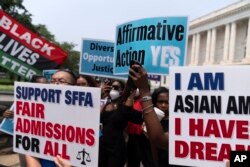A civil rights group is taking legal action against legacy admissions at Harvard University. It says the practice discriminates against students of color by giving special consideration to mostly white children of alumni.
The practice has faced growing criticism after the recent Supreme Court decision that ended the consideration of race in college admissions at Harvard and the University of North Carolina. The decision ended admissions policies used by American colleges to increase the number of Black, Hispanic and other minority groups.
The legal action was filed Monday by Lawyers for Civil Rights, a nonprofit group based in Boston. The group filed the complaint on behalf of Black and Latino community groups in New England. It argued that Harvard’s admissions system violates the Civil Rights Act.
“Your family’s last name and the size of your bank account are not a measure of merit, and should have no bearing on the college admissions process,” said Ivan Espinoza-Madrigal. He is the group's executive director.
The civil rights group National Association for the Advancement of Colored People (NAACP) added its support to the effort on Monday. And the group asked more than 1,500 colleges and universities to make admissions more fair, including by ending legacy admissions.
Opponents of legacy admissions say the practice is no longer defensible following the high court’s decision. They note that the Supreme Court’s ruling says colleges must ignore the race of applicants but schools can still give a lift to the children of alumni and donors.
The complaint was submitted to the Education Department’s Office for Civil Rights. It uses Harvard data that became public during the affirmative action case that went before the Supreme Court. The records showed that 70 percent of Harvard’s donor-related and legacy applicants are white. Being a legacy student makes an applicant about six times more likely to be admitted.
The complaint points out that other selective schools, including Amherst College in Massachusetts and Johns Hopkins University of Maryland, have ended the practice.
The complaint argues that Harvard’s legacy preference has nothing to do with merit and takes away spots from qualified students of color. It asks the U.S. Education Department to declare the practice illegal. It also asks the department to force Harvard to stop the practice as long as the university receives federal funding.
If legacy and donor preferences were removed, “more students of color would be admitted to Harvard,” the complaint says.
Harvard said it would not comment on the complaint.
The complaint was filed on behalf of Chica Project, African Community Economic Development of New England, and the Greater Boston Latino Network.
Also Monday, the NAACP started a campaign aimed to get universities across the nation to improve diversity. The group called on 532 public and 1,134 private colleges and universities to end legacy preferences, eliminate “racially biased” entrance exams, hire teachers from different backgrounds, and support poor and first-generation students.
Another campaign is urging the alumni of 30 top colleges to stop giving donations until their schools end legacy admissions. That campaign, led by education nonprofit Ed Mobilizer, also targets Harvard and other Ivy League schools.
U.S. President Joe Biden suggested last week that universities should rethink the practice. He said legacy admissions “expand privilege instead of opportunity.”
It is unclear exactly which schools use legacy admissions and how much it helps. In California, state law requires schools to say if they use legacy admissions. The University of Southern California reported that 14 percent of last year’s admitted students had family ties to alumni or donors. Stanford reported a similar rate.
An Associated Press survey of the nation’s most selective colleges last year found that legacy students in the freshman class ranged from 4 percent to 23 percent. At four schools — Notre Dame, the University of Southern California, Cornell and Dartmouth — legacy students outnumbered Black students.
Supporters of legacy admissions say it builds an alumni community and can increase donations. The donations, they add, can help support poor students of color.
I’m Dan Novak.
Dan Novak adapted this story for VOA Learning English based on reporting from Associated Press.
_________________________________________________________________
Words in This Story
legacy— n. something that happened in the past or that comes from someone in the past
admission — n. the right or permission to enter a place
alumni — n. someone who was a student at a particular school, college, or university
complaint — n. a statement that you are unhappy or not satisfied with something
merit — n. a good quality or feature that deserves to be praised
bearing — n. the way in which a person moves, stands, or behaves
applicant — n. someone who formally asks for something
preference — n. a feeling of liking or wanting one person or thing more than another person or thing
biased — adj. having or showing a bias
privilege — n. a right or benefit that is given to some people and not to others
opportunity — n. an amount of time or a situation in which something can be done








Forum